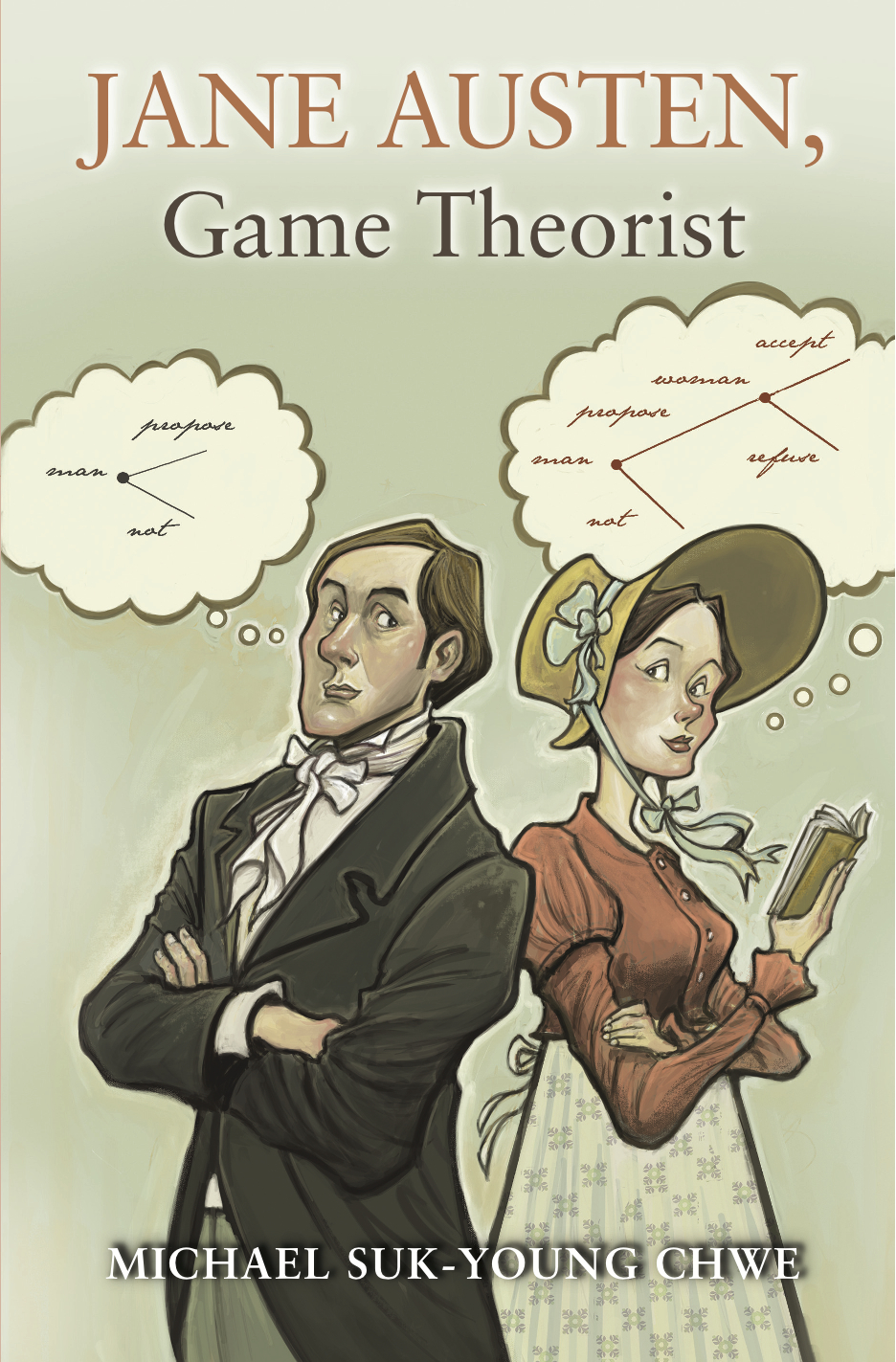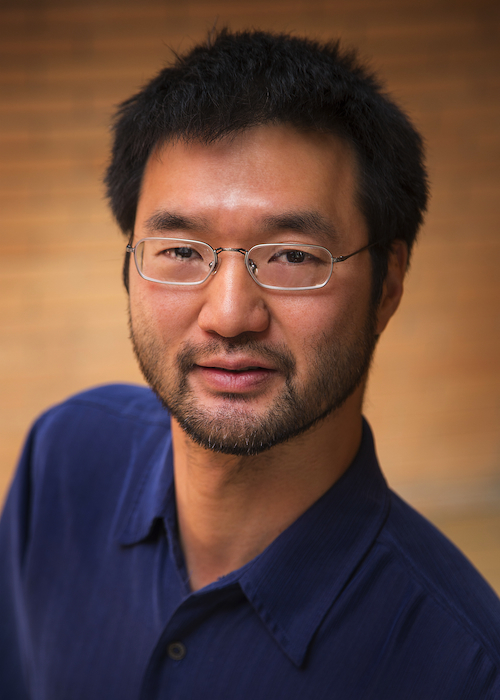
illustration by Sonny Liew
Read the table of contents
and first chapter
Browse on Google Books
Order the book at
Amazon | Barnes and Noble | The Book Depository | Seminary Co-op
Princeton University Press

Michael Chwe
Department of Political Science
UCLA
Bibliography of Jane Austen, Game Theorist
(pdf files of all the papers referenced)
—Regenia
Gagnier, author of The
Insatiability of Human Wants: Economics and
Aesthetics in Market Society
“Michael Chwe shows that Jane Austen is a strategic analyst—a game theorist whose characters exercise strategic thinking. Game theorists usually study war, business, crime and punishment, diplomacy, politics, and one-upmanship. Jane Austen studies social advancement, romantic relationships, and even gamesmanship. Game theorists will enjoy this venture into unfamiliar territory, while Jane Austen fans will enjoy being illuminated about their favorite author’s strategic acumen—and learn a little game theory besides.”
“Jane Austen’s novels provide wonderful examples of strategic thinking in the lives of ordinary people. In Jane Austen, Game Theorist, Michael Chwe brilliantly brings out these strategies, and Austen’s intuitive game-theoretic analysis of these situations and actions. This book will transform the way you read literature.”
—Avinash
Dixit, coauthor of The Art of
Strategy: A Game Theorist's Guide to Success in
Business and Life
“Jane Austen, game theorist?! You will cry, how absurd! But you will be wrong. Michael Chwe’s beautifully written and argued book makes the case, crushingly, that Our Jane was fascinated by human prudent interaction—what the game theorists call strategy. Based on deep familiarity with the novels and their scholarly literature, his book will instruct and delight both literary critics and economists. Combining the humanities and social sciences for mutual illumination, Chwe practices a ‘humanomics’ masterfully.”
—Deirdre N.
McCloskey, University of Illinois, Chicago
“It
would be useful for everyone to understand a little
bit more about strategic thinking. Jane Austen seems
not only to get this, but to explore it obsessively.
Looking at Austen and other works, this persuasive
book shows that the game theory in historical sources
is not inherently opposed to humanistic thinking, but
embedded within it.”
“Polished, organized, and well-documented, this book demonstrates the existence of well-defined game theory in historical texts. Jane Austen, in particular, develops a clear model of strategic thinking in her novels. Michael Chwe shows the efficacy and pitfalls of such thinking in her characters’ actions, and in their perceptions and understanding of the actions of others. An enjoyable read.”
—Laura J. Rosenthal,
University of Maryland
“Polished, organized, and well-documented, this book demonstrates the existence of well-defined game theory in historical texts. Jane Austen, in particular, develops a clear model of strategic thinking in her novels. Michael Chwe shows the efficacy and pitfalls of such thinking in her characters’ actions, and in their perceptions and understanding of the actions of others. An enjoyable read.”
—Susan
Skeath, coauthor of Games
of Strategy
—Siddharth Singh, Mint
“Austen devotees will probably enjoy the many pages of painstaking precis in which Chwe reveals the strategic thinking of one character after another. Often he is acute, showing in slow-motion detail, for instance, how, in Mansfield Park, the supposedly unworldly Fanny Price grows into a deft ‘strategist’, quite fit to compete with sly Mary Crawford. Game theory starts with the idea of the human being as a choice-maker, and Chwe is right to think that this chimes with Austen.”
—John Mullan, The
Guardian
“I started by reading ‘chapter one: the argument’ and I am already hooked. This book presents an unlikely marriage between literature and mathematical thinking, written long before game theory became a formalised area of research. This is such a fabulous book—carefully written, thoughtful and insightful—that I imagine that it is already in use in a college course. In fact, I would very much like to register for that course.”
—GrrlScientist, The
Guardian
“Jane Austen, Game Theorist . . . is more than the larky scholarly equivalent of ‘Pride and Prejudice and Zombies.’. . . Mr. Chwe argues that Austen isn’t merely fodder for game-theoretical analysis, but an unacknowledged founder of the discipline itself: a kind of Empire-waisted version of the mathematician and cold war thinker John von Neumann, ruthlessly breaking down the stratagems of 18th-century social warfare.”
—Jennifer
Schuessler, New
York Times
“The most interesting part of the book
for me was about why, indeed, there are people who do
not strategise. . . . [I]t has often amazed me how
unstrategic most people are, especially in business.
It is harder, a bit, to think about how other people
will react to your actions and choices, but not that
hard. Jane Austen, Game Theorist should join
the list of strategic classics like The Art of War,
or the good how-to game theory guides like Dixit and
Nalebuff’s Thinking Strategically, on the
shelf of everybody who wants to be effective in life.”
—Diane Coyle,
The
Enlightened Economist